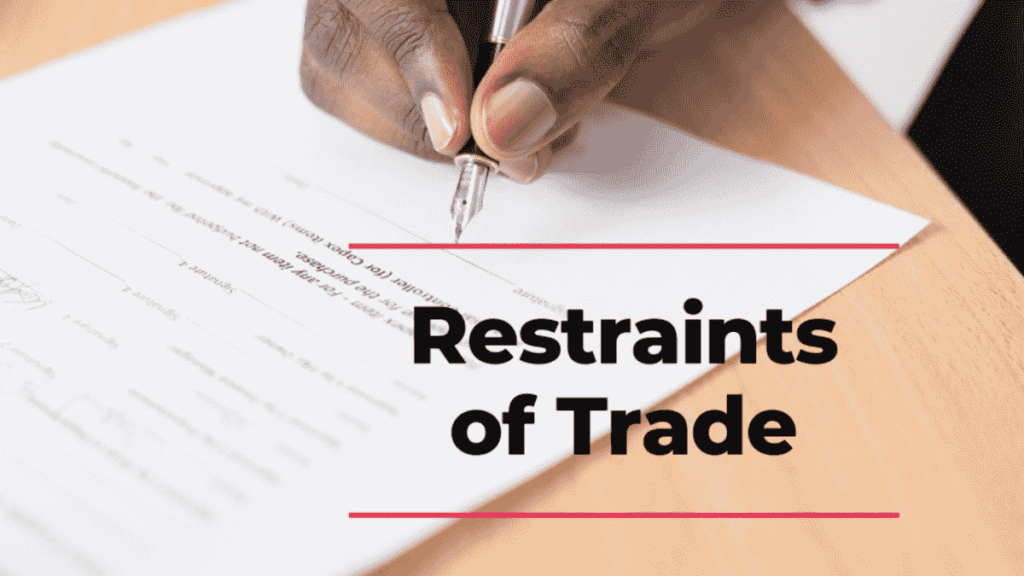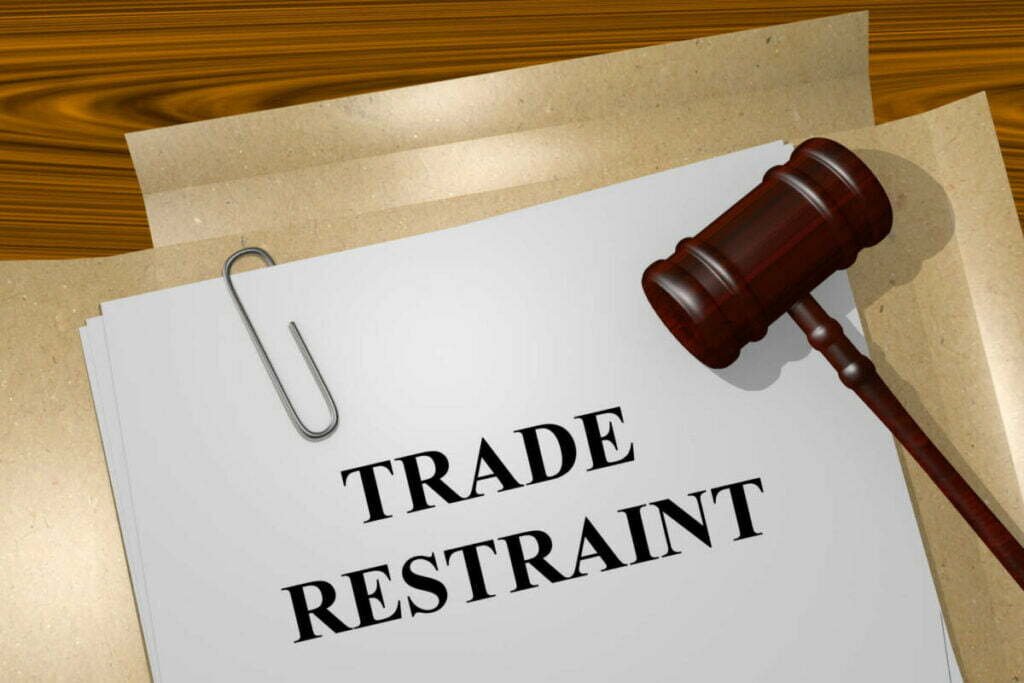Restraint of Trade: Legal agreements or practices that limit the free flow of products, services, or workers in a cutthroat market are referred to as restraints on trade. Non-compete provisions, exclusive distribution contracts, and price-fixing agreements are a few examples of these constraints.
While certain limitations may have good justifications, such as promoting innovation or preserving confidential information, they can raise questions about possible anti-competitive activity and diminished consumer welfare.

In order to ensure fair competition and allow firms to safeguard their legitimate interests, governments and regulatory organizations across the world strive to find a balance. Trade restrictions may have an effect on certain industries, market trends, and general economic expansion. These restrictions are frequently assessed by taking into account variables including their length, geographic reach, and possible impact on market competitiveness.
Legal systems differ between countries, with some restrictions being prohibited or being closely scrutinized. As markets change, so does our notion of trade constraint, influencing the limits of proper commercial conduct.
Restraint of Trade Definition
The simplest definition of “restraint of trade” is any action that stops another party from carrying on business as usual in the absence of such a constraint. For instance, it is unlawful to impede commerce when two companies agree to establish prices in order to drive out a rival.
Other instances include monopolizing a market, pressuring a rival to quit doing business with you, or forcibly interfering with a commercial transaction (see Tortious Interference). Non-competition agreements with workers in places where such agreements — if regarded reasonable — are enforceable are among the barriers of commerce that are not necessarily illegal.
The Clayton Act, the Federal commerce Commission Act, and numerous state antitrust laws all codify the notion of restriction of commerce, which has its origins in English common law. Although trade restriction and other antitrust violations are illegal under the Sherman Antitrust Act and several state laws, those who incur losses as a result of such violations may seek monetary compensation in civil court.

This article focuses on civil litigation for financial damages brought on by improper trade restrictions.
Doctrine of Trade Restraint
A legal doctrine known as the doctrine of restraint of trade applies to contracts that restrict or limit a person or an entity’s capacity to participate in particular competitive activities.
This theory tries to strike a balance between the promotion of fair competition and individual freedom to labor and trade and the interests of preserving legitimate company interests, such as trade secrets and customer connections.
Reasonable Restrictions on Trade
Contractual constraints that are just and required to protect genuine corporate interests without unnecessarily restricting competition or individual rights are considered reasonable restraints on trade.
Non-compete and non-solicitation provisions are popular forms of these limitations.
Such limits must be particular, target clearly defined interests like trade secrets or client relationships, and have a length that is fair and commensurate to the level of protection required in order to be enforceable. The restriction must have a reasonable business purpose and the geographic breadth must match the actual company reach.

The sector, the positions of the parties, and the possible influence on people’s livelihoods are all taken into consideration. To make sure the limitation doesn’t hurt the market, courts consider the general public interest and competitiveness.
A balance between protection and competitiveness is desired. In the end, acceptable limits are those that don’t go too far and sensibly protect legitimate company interests without putting a disproportionate burden on people or impeding healthy competition.
Courts decide whether something is enforceable based on the principles of rationality and justice, although enforcement differs depending on the jurisdiction and the details of the case.
Conclusion
For firms to be protected while maintaining fair competition, acceptable constraints on restraint of trade are crucial. These restrictions strike a delicate balance between protection and freedom because they were carefully developed with respect for scope, duration, and legitimate objectives.
The courts are essential in determining whether these limitations adhere to the concepts of reasonableness, justice, and public interest.
By preserving this balance, the legal system promotes creativity, safeguards intellectual property, and upholds individual rights while also assisting in the healthy operation of competitive markets.
References
- Restraint of Trade – FindLaw
- restraint of trade | Wex | US Law | LII / Legal Information Institute (cornell.edu)